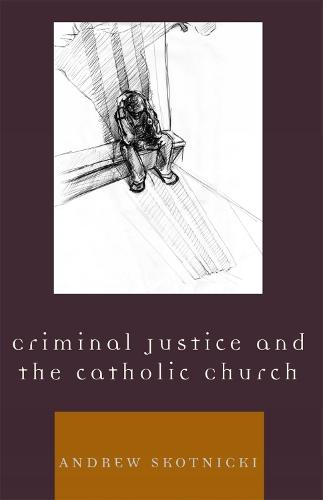Overview
The Catholic Church has had a dramatic impact on both the structure and understanding of criminal justice up to the present. This book surveys the history of the church to suggest that despite demonstrable abuses, a humane and redemptive theory of criminal justice can be constructed that is harmonious with biblical sources, tradition, and current normative emphases in Catholic social thought.
Full Product Details
Author: Andrew Skotnicki
Publisher: Bloomsbury Publishing Plc
Imprint: Rowman & Littlefield Publishers
Dimensions:
Width: 16.20cm
, Height: 1.90cm
, Length: 23.70cm
Weight: 0.404kg
ISBN: 9780742552029
ISBN 10: 0742552020
Pages: 174
Publication Date: 27 September 2007
Audience:
College/higher education
,
Undergraduate
Format: Hardback
Publisher's Status: Active
Availability: In Print

This item will be ordered in for you from one of our suppliers. Upon receipt, we will promptly dispatch it out to you. For in store availability, please contact us.
Reviews
"Andrew Skotnicki provides a richly rewarding examination of our penal system that is historically and ethically informed. His overall argument is cogent and important. If you want to understand how Catholic thought and practice both have and should influence penal reform, this book is an excellent place to start. -- Kenneth Himes, Boston College, past president of the Catholic Theological Society of America By looking at the ""Catholic"" roots of the penal institution, Andrew Skotnicki invites us to consider how we can work toward the full social restoration of today's prisoner. There is a great deal of needed humanity, wisdom, and hope in these pages, especially at a time when those in prison live lives completely estranged from our own. -- James F. Keenan, SJ Drawing richly upon historical testimony, Criminal Justice and the Catholic Church is a splendid, lucidly written assessment of the theological and ethical implications of incarceration. Skotnicki's ground-breaking retrieval of the image of Christ as prisoner offers a powerful, and all too timely corrective to prevailing retributive practices. -- William R. O'Neill, Jesuit School of Theology Andrew Skotnicki... has done a great service by producing in this book a carefully articulated and historically grounded Catholic theory of criminal justice.... A careful, concise, and accessible survey.... Skotnicki writes clearly. The book is full of historical and theological insight, and—most importantly— it gives a much-needed rationale for injecting American criminal justice practices with a strong dose of humanity.... A well argued, and engagingly written book. Other fruitful questions, too, will arise for each of its (hopefully many) readers. -- Ted Grimsrud * Modern Theology, April 2009 * Rich in its history and stark in its implications, Criminal Justice and the Catholic Church illustrates the tragic distance between intent and effect in our contemporary practice and culture of incarceration. -- Mary Ellen Dougherty, SSND, United States Conference of Catholic Bishops"
Andrew Skotnicki provides a richly rewarding examination of our penal system that is historically and ethically informed. His overall argument is cogent and important. If you want to understand how Catholic thought and practice both have and should influence penal reform, this book is an excellent place to start. -- Kenneth Himes, Boston College, past president of the Catholic Theological Society of America By looking at the Catholic roots of the penal institution, Andrew Skotnicki invites us to consider how we can work toward the full social restoration of today's prisoner. There is a great deal of needed humanity, wisdom, and hope in these pages, especially at a time when those in prison live lives completely estranged from our own. -- James F. Keenan, S.J., Boston College Drawing richly upon historical testimony, Criminal Justice and the Catholic Church is a splendid, lucidly written assessment of the theological and ethical implications of incarceration. Skotnicki's ground-breaking retrieval of the image of Christ as prisoner offers a powerful, and all too timely corrective to prevailing retributive practices. -- William R. O'Neill, Jesuit School of Theology Andrew Skotnicki... has done a great service by producing in this book a carefully articulated and historically grounded Catholic theory of criminal justice.... A careful, concise, and accessible survey.... Skotnicki writes clearly. The book is full of historical and theological insight, and-most importantly- it gives a much-needed rationale for injecting American criminal justice practices with a strong dose of humanity.... A well argued, and engagingly written book. Other fruitful questions, too, will arise for each of its (hopefully many) readers. -- Ted Grimsrud * Modern Theology, April 2009 * Rich in its history and stark in its implications, Criminal Justice and the Catholic Church illustrates the tragic distance between intent and effect in our contemporary practice and culture of incarceration. -- Mary Ellen Dougherty, SSND, United States Conference of Catholic Bishops
Rich in its history and stark in its implications, Criminal Justice and the Catholic Church illustrates the tragic distance between intent and effect in our contemporary practice and culture of incarceration.--Mary Ellen Dougherty, SSND
Author Information
Andrew Skotnicki is associate professor of Christian ethics at Manhattan College. He is the author of Religion and the Development of the American Penal System as well as numerous scholarly articles on the theological and moral foundations of criminal justice.



